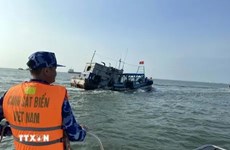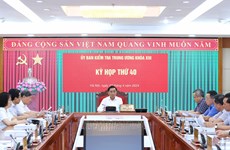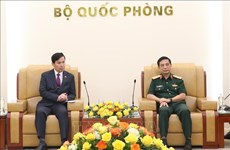Vietnam’s role in ASEAN after 15 years
Joining the ASEAN has brought about practical benefits to Vietnam in its
drive for national construction and security, Deputy Prime Minister and
Foreign Minister Pham Gia Khiem wrote.
Joining the ASEAN has brought about practical benefits to Vietnam in its
drive for national construction and security, Deputy Prime Minister and
Foreign Minister Pham Gia Khiem wrote in an article reviewing the past
15 years of Vietnam’s ASEAN membership, in which he also talked about
ASEAN’s future targets, including establishing an ASEAN Community by
2015.
The article reads as follows:
On July 28, 1995, Vietnam’s national flag was hoisted at a ceremony held in Brunei to admit Vietnam as the Association of Southeast Asian Nations (ASEAN)’s 7th member, marking a milestone in the country’s regional and global integration as well as in ASEAN’s development.
Since then Vietnam has taken an active part in the association’s affairs and has made many contributions to its development. Membership also brought about practical benefits to Vietnam in its drive for national construction and security.
The 15th anniversary of Vietnam entering ASEAN is a good time to review what has been done and what is still to do, first and foremost is the creation of an ASEAN Community by 2015.
Vietnam ’s impact on ASEAN
Over the past 15 years, Vietnam has actively taken part in ASEAN affairs and has made many important contributions to the association in a number of cooperative fields including defining the way ahead for the association, its cooperation development and major policies, which has helped to strengthen solidarity and cooperation amongst ASEAN members and raise the association’s status in the international arena.
With a desire for a peaceful, stable and prosperous region, Vietnam and other ASEAN members have overcome their differences, settled outstanding issues left over by history and boosted comprehensive cooperation in a spirit of friendship and solidarity.
Vietnam joining the bloc in 1995 was seen as an important step in the association’s plans to expand and develop. As soon as Vietnam became a member of ASEAN, the country actively promoted the admission of Laos , Myanmar and Cambodia to ASEAN, which helped to create an ASEAN that included all 10 Southeast Asian countries and open a new chapter of solidarity, friendship and cooperation in the region. A 10 member ASEAN was an important development for the association, as this laid the foundations for ASEAN to become a significant regional bloc that now plays an important role in the Southeast Asian and Asia-Pacific regions.
Vietnam ’s influence is clearly shown in the organising of several important ASEAN events as well as in ASEAN’s decision making. After only three years of ASEAN membership, Vietnam had made a deep impression on the bloc as well as international friends by successfully hosting the 6 th ASEAN Summit in Hanoi in December 1998. The summit adopted the Hanoi Plan of Action (HPA) that focused on the 2020 ASEAN Vision, which has helped ASEAN to maintain unity and cooperation within the group and strengthened the association’s standing in the world after ASEAN was badly hit by the financial and economic crisis in 1997 and 1998.
Vietnam then successfully took over the chair of the ASEAN Standing Committee from July 2000 to July 2001, leading other ASEAN members to adopt the Hanoi Statement on narrowing the development gap at the 34 th ASEAN Foreign Ministers’ Meeting in July 2001.
Vietnam also plays an important role in driving ASEAN into a new stage of development, leading to an ASEAN Community by 2015, that will operate under the ASEAN Charter with the three main principles of Politics- Security, Economics and Culture-Society.
This year, Vietnam has taken over the chair of ASEAN for the second time. With the theme “Towards an ASEAN community: From Vision to Action”, Vietnam is doing its utmost to coordinate and accelerate measures to implement the ASEAN Charter and ASEAN’s plans to build an ASEAN Community and expand and deepen cooperative ties between the bloc and its partners, while strengthening and maintaining ASEAN’s central role in the process of regional cooperation. The success of the 16 th ASEAN Summit in Hanoi in April 2010 and ministerial level meetings including the 43 rd ASEAN Foreign Ministers’ Meeting and other related meetings in Hanoi in July are an indication of Vietnam ’s efforts to promote moves that encourage the formation of an ASEAN Community.
Deputy PM Khiem said that the past 15 years have shown that the Party and the State’s tactical decision to join ASEAN was a good move, made at the right time and was significant in both historical and strategic terms.
Becoming part of ASEAN has already brought and will bring in the future a great deal of benefit in the fields of politics, security, economics, culture, social affairs and external relations.
Above all, it has helped Vietnam to retain an international climate that is favourable for its development and security as well as facilitate its regional and international integration, said Khiem.
Vietnam’s joining of ASEAN has helped to maintain a peaceful and stable environment and create the best possible conditions for cooperation and development in Southeast Asia by building an integrated and closely connected ASEAN Community with a more important role in the region and shepherding new relationships amongst member countries.
Integrating and participating in ASEAN has enabled Vietnam to gain real socio-cultural and commercial-economic benefits, which have aided the country’s socio-economic development, the Deputy PM emphasised.
Becoming part of ASEAN’s internal economic network as well as free trade agreements that the group signed with its partners, has helped Vietnam to attract an increasing volume of foreign investment capital and at the same time given it access to other markets, both regionally and globally.
Moreover, Vietnam has gained access to scientific and technological advances and modern methods of management plus it has been helped to enhance its institutional capacity and ability to handle transnational issues in fields such as the environment, natural disasters, diseases and climate change, said Khiem.
He confirmed that ASEAN membership has enabled Vietnam to broaden its horizons and step up cooperation with its ASEAN partners, especially the bigger countries, while participating more in inter-regional or international cooperation frameworks. These include ASEAN+3, the East Asia Summit (EAS), the Asia-Pacific Economic Cooperation (APEC) Forum, the Asia-Europe Meeting (ASEM) and the World Trade Organisation (WTO), which have heightened its role and prestige in the international arena.
At present, Vietnam is concentrating on an all-out effort to fulfill its task as ASEAN Chair in 2010. This will contribute to realising ASEAN’s goals, further the country’s international role and highlight Vietnam as a dynamic country that pursues a foreign policy of independence, self-reliance, peace, cooperation and development.
As an integral part of ASEAN, Vietnam will continue to work side by side with its partners to ensure a brighter future for the ASEAN Community, said Khiem./.
The article reads as follows:
On July 28, 1995, Vietnam’s national flag was hoisted at a ceremony held in Brunei to admit Vietnam as the Association of Southeast Asian Nations (ASEAN)’s 7th member, marking a milestone in the country’s regional and global integration as well as in ASEAN’s development.
Since then Vietnam has taken an active part in the association’s affairs and has made many contributions to its development. Membership also brought about practical benefits to Vietnam in its drive for national construction and security.
The 15th anniversary of Vietnam entering ASEAN is a good time to review what has been done and what is still to do, first and foremost is the creation of an ASEAN Community by 2015.
Vietnam ’s impact on ASEAN
Over the past 15 years, Vietnam has actively taken part in ASEAN affairs and has made many important contributions to the association in a number of cooperative fields including defining the way ahead for the association, its cooperation development and major policies, which has helped to strengthen solidarity and cooperation amongst ASEAN members and raise the association’s status in the international arena.
With a desire for a peaceful, stable and prosperous region, Vietnam and other ASEAN members have overcome their differences, settled outstanding issues left over by history and boosted comprehensive cooperation in a spirit of friendship and solidarity.
Vietnam joining the bloc in 1995 was seen as an important step in the association’s plans to expand and develop. As soon as Vietnam became a member of ASEAN, the country actively promoted the admission of Laos , Myanmar and Cambodia to ASEAN, which helped to create an ASEAN that included all 10 Southeast Asian countries and open a new chapter of solidarity, friendship and cooperation in the region. A 10 member ASEAN was an important development for the association, as this laid the foundations for ASEAN to become a significant regional bloc that now plays an important role in the Southeast Asian and Asia-Pacific regions.
Vietnam ’s influence is clearly shown in the organising of several important ASEAN events as well as in ASEAN’s decision making. After only three years of ASEAN membership, Vietnam had made a deep impression on the bloc as well as international friends by successfully hosting the 6 th ASEAN Summit in Hanoi in December 1998. The summit adopted the Hanoi Plan of Action (HPA) that focused on the 2020 ASEAN Vision, which has helped ASEAN to maintain unity and cooperation within the group and strengthened the association’s standing in the world after ASEAN was badly hit by the financial and economic crisis in 1997 and 1998.
Vietnam then successfully took over the chair of the ASEAN Standing Committee from July 2000 to July 2001, leading other ASEAN members to adopt the Hanoi Statement on narrowing the development gap at the 34 th ASEAN Foreign Ministers’ Meeting in July 2001.
Vietnam also plays an important role in driving ASEAN into a new stage of development, leading to an ASEAN Community by 2015, that will operate under the ASEAN Charter with the three main principles of Politics- Security, Economics and Culture-Society.
This year, Vietnam has taken over the chair of ASEAN for the second time. With the theme “Towards an ASEAN community: From Vision to Action”, Vietnam is doing its utmost to coordinate and accelerate measures to implement the ASEAN Charter and ASEAN’s plans to build an ASEAN Community and expand and deepen cooperative ties between the bloc and its partners, while strengthening and maintaining ASEAN’s central role in the process of regional cooperation. The success of the 16 th ASEAN Summit in Hanoi in April 2010 and ministerial level meetings including the 43 rd ASEAN Foreign Ministers’ Meeting and other related meetings in Hanoi in July are an indication of Vietnam ’s efforts to promote moves that encourage the formation of an ASEAN Community.
Deputy PM Khiem said that the past 15 years have shown that the Party and the State’s tactical decision to join ASEAN was a good move, made at the right time and was significant in both historical and strategic terms.
Becoming part of ASEAN has already brought and will bring in the future a great deal of benefit in the fields of politics, security, economics, culture, social affairs and external relations.
Above all, it has helped Vietnam to retain an international climate that is favourable for its development and security as well as facilitate its regional and international integration, said Khiem.
Vietnam’s joining of ASEAN has helped to maintain a peaceful and stable environment and create the best possible conditions for cooperation and development in Southeast Asia by building an integrated and closely connected ASEAN Community with a more important role in the region and shepherding new relationships amongst member countries.
Integrating and participating in ASEAN has enabled Vietnam to gain real socio-cultural and commercial-economic benefits, which have aided the country’s socio-economic development, the Deputy PM emphasised.
Becoming part of ASEAN’s internal economic network as well as free trade agreements that the group signed with its partners, has helped Vietnam to attract an increasing volume of foreign investment capital and at the same time given it access to other markets, both regionally and globally.
Moreover, Vietnam has gained access to scientific and technological advances and modern methods of management plus it has been helped to enhance its institutional capacity and ability to handle transnational issues in fields such as the environment, natural disasters, diseases and climate change, said Khiem.
He confirmed that ASEAN membership has enabled Vietnam to broaden its horizons and step up cooperation with its ASEAN partners, especially the bigger countries, while participating more in inter-regional or international cooperation frameworks. These include ASEAN+3, the East Asia Summit (EAS), the Asia-Pacific Economic Cooperation (APEC) Forum, the Asia-Europe Meeting (ASEM) and the World Trade Organisation (WTO), which have heightened its role and prestige in the international arena.
At present, Vietnam is concentrating on an all-out effort to fulfill its task as ASEAN Chair in 2010. This will contribute to realising ASEAN’s goals, further the country’s international role and highlight Vietnam as a dynamic country that pursues a foreign policy of independence, self-reliance, peace, cooperation and development.
As an integral part of ASEAN, Vietnam will continue to work side by side with its partners to ensure a brighter future for the ASEAN Community, said Khiem./.













